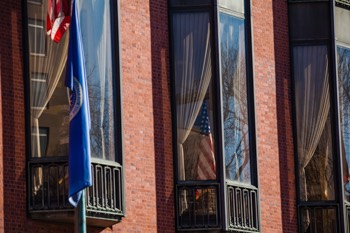 Amgen Inc. v. Apotex Inc. (Fed. Cir. July 5, 2016) (Before Wallach, Bryson, and Taranto, J.) (Opinion for the court, Taranto, J.)
Amgen Inc. v. Apotex Inc. (Fed. Cir. July 5, 2016) (Before Wallach, Bryson, and Taranto, J.) (Opinion for the court, Taranto, J.)
Apotex submitted an application with the FDA under the Biologics Act (“the Act”), seeking approval to market a product that is biosimilar to Amgen’s FDA approved Neulasta®, which stimulates neutrophils in chemotherapy patients, to decrease the risk of infection. When Amgen obtained its FDA license for Neulasta®, it had to show the product was “safe, pure, and potent.” Apotex sought approval for a product sufficiently similar to Amgen’s “reference product,” without repeating all of the work of the pioneer, by showing that its product is “biosimilar” to Neulasta®.
Within 20 days after the FDA notifies the biologics applicant that its application has been accepted for review, the applicant must comply with section 2(A) of the Act, and notify the reference product sponsor. The Notice must provide the biosimilar application and information describing the manufacturing process for the proposed product. Within 60 days of this notice, the sponsor must provide a list of patents that could be asserted against the applicant and indicate whether it would be prepared to license any patents to the applicant. The Act sets forth the steps that both parties are to follow in order to exchange information.
The Act additionally amended the infringement provisions of the Patent Act, to set forth two circumstances that are each “an act of infringement” arising from a biosimilar application. One circumstance is when the patent has been listed by the sponsor according to the Biologics Act. The second is when the applicant fails to give the required notice of its application to the product sponsor under section 2(A).
[Troutman-Ad]
Apotex filed its biologics application in 2014 and complied with the 2(A) notice provisions. Amgen identified three patents that could be asserted against Apotex. Apotex then provided patent-specific responses under the Act. Apotex certified that it did not intend to begin marketing before two of the patents expired, and asserted noninfringement and invalidity of the third patent. Amgen furnished Apotex its reply regarding validity and infringement. Pursuant to section (4) of the Biologics Act, the parties negotiated which of the patents would be the subject of an immediate patent-infringement action.
Just before that action was filed, the Court decided Amgen v. Sandoz, which held that a party must give notice after FDA approval of the biosimilar product, not just before. Pre-license notices under section 2(A) were given no legal effect under the separate section (8)(A) of the Act. Section (8)(A) requires that an applicant give the sponsor notice at least 180 days before commercially marketing its approved (“licensed”) product. The Court held that a separate section (8)(A)notice was mandatory, and did not depend on any earlier information-exchange provisions.
In this case, Amgen asked the district court for a preliminary injunction to require Apotex to provide a section (8)(A) notice when it received its FDA license, and to delay commercial marketing for 180 days from that notice. The Court’s decision turned on whether Amgen was likely to show that the (8)(A) notice requirement was mandatory and enforceable by an injunction against Apotex, given the prior (2)(A) notice Apotex gave to Amgen. These facts differed from Amgen v. Sandoz, where no section (2)(A) notice had been given. The district court granted Amgen’s request for a preliminary injunction, and Apotex appealed.
The Federal Circuit held that there was no statutory language that made section (8)(A) non-mandatory. Further, Amgen v. Sandoz disposed of Apotex’s argument that (8)(A) would extend the 12-year exclusivity period given to a sponsor by 180 days (six additional months). Even when market entry is delayed under (8)(A) by 12 years plus 180 days, the result is the same, because the 12-year date is established as the earliest date, not the latest date, on which a biosimilar license can take effect. The Court affirmed that section (8)(A) covers applicants that filed (2)(A) notices as well as those that did not. This is to ensure that the necessary decision-making regarding further patent litigation starts from when the applicant’s product, uses, and processes are fixed by the FDA license. The 180-day period gives the sponsor essential time to assess its infringement position for the final FDA approved product and the as to yet-to-be-litigated patents. This is confirmed by the legislative history of the Biologics Act. Thus, an applicant must provide a reference product sponsor with the 180-day notice under 8(A), after approval and before commercial marketing begins, whether or not the applicant previously provided a (2)(A) notice of the FDA review.
Apotex also argued that the Act made a declaratory-judgment action the exclusive remedy for (8)(A) violations, a route Amgen did not take. The Court disagreed, noting that the statutory language was not so limited. Further, declaratory judgment as the sole remedy would not actually compel enforcement of the categorically “mandatory” (8)(A) notice. Instead, relegating a product sponsor to a declaratory-judgment action would introduce the problem of rushed decision-making as to the patent merits, which is what section (8)(A) is meant to avoid.
For all these reasons, the Court affirmed the district court’s grant of a preliminary injunction.
Applicants for FDA approval of a biosimilar drug product are now “on notice” to give the sponsor of the original approved product a mandatory 180 day warning that a specific product has been approved, so that the sponsor can evaluate its patents and litigation options. Product sponsors should be on the lookout for this notice, and can take action to secure the notice and the 180-day window if it is not forthcoming.
Also contributing to this summary were Parker Hancock and Puja Dave.
[Troutman-Ad]

![[IPWatchdog Logo]](https://ipwatchdog.com/wp-content/themes/IPWatchdog%20-%202023/assets/images/temp/logo-small@2x.png)


![[Advertisement]](https://ipwatchdog.com/wp-content/uploads/2024/04/Patent-Litigation-Masters-2024-sidebar-early-bird-ends-Apr-21-last-chance-700x500-1.jpg)

![[Advertisement]](https://ipwatchdog.com/wp-content/uploads/2021/12/WEBINAR-336-x-280-px.png)
![[Advertisement]](https://ipwatchdog.com/wp-content/uploads/2021/12/2021-Patent-Practice-on-Demand-recorded-Feb-2021-336-x-280.jpg)
![[Advertisement]](https://ipwatchdog.com/wp-content/uploads/2021/12/Ad-4-The-Invent-Patent-System™.png)







Join the Discussion
No comments yet.